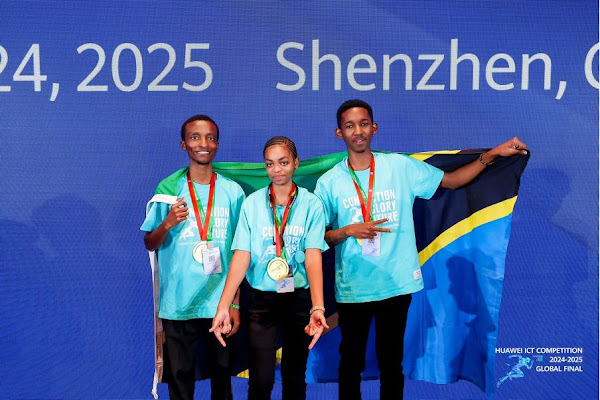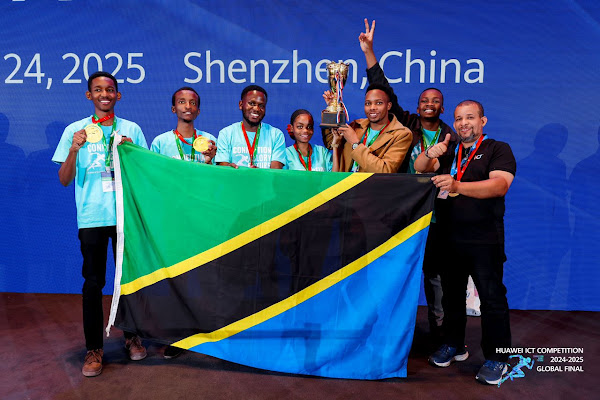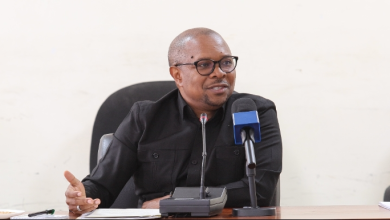Tanzanian students electrify global stage at Huawei ICT Competition

IN a remarkable achievement that has put Tanzania on the global technology map, university students from across the country have emerged as top winners in the prestigious 2024–2025 Huawei ICT Competition.
Outperforming more than 210,000 contestants worldwide, these students demonstrated not only technical expertise but also innovation, creativity and the power of Tanzanian talent in the field of information and communications technology (ICT).
The global finals of this highly competitive event were held in Shenzhen, China- a city known as the heart of the world’s tech innovation.
Here, the best and brightest young minds from various countries gathered to showcase their skills in areas like cloud computing, big data analytics and artificial intelligence (AI).
Tanzanian participants from three key institutions namely the Dar es Salaam Institute of Technology (DIT), the University of Dar es Salaam (UDSM) and the University of Dodoma (UDOM) walked away with both grand prizes and runner-up honours, turning heads and raising the profile of Tanzanian ICT education and innovation.
Winners who made Tanzania proud At the centre of this success are the students who trained, practiced and competed with passion and perseverance.
The grand prize winners include Vida Mapunda from DIT, Joseph Msuya representing UDSM and Sigfrid Michael of UDOM. These exceptional individuals were recognised for their mastery in complex ICT challenges, proving that Tanzanian students can compete at the highest international level.
Not far behind in the competition, the second place category saw Paul Nkingwa, Godlove Hipolite and Felix Kuluchumila, all from UDOM, receive honours for their stellar performances. Their collective success highlights the growing strength and depth of Tanzania’s ICT talent pool.

But it was not just the students who impressed. Huawei also acknowledged the outstanding work of Tanzanian instructors who guided and mentored these young innovators.
Mr Jumanne Ally from DIT was awarded the grand prize for instructors, while Dr Alex Mongi from UDOM secured second place in the same category.
Their dedication has played a pivotal role in nurturing the skills and confidence of Tanzania’s next generation of ICT leaders.
What is the Huawei ICT Competition?
The Huawei ICT Competition is an annual event designed to bridge the gap between theoretical knowledge and practical skills. Organised by Huawei Technologies, it encourages students to develop real-world solutions using cutting-edge technologies such as cloud computing, big data, AI and more.
The competition aims to foster innovation that addresses pressing challenges in sectors like agriculture, healthcare, education and environmental sustainability.
More than a contest, the Huawei ICT Competition is a platform for learning, collaboration and inspiration. It reflects Huawei’s vision of an “Intelligent World 2030,” where technology enables inclusive growth and sustainable development.
Ritchie Peng, Huawei’s Director of ICT Strategy and Business Development, emphasised this vision during the opening ceremony, noting how the competition aligns with global innovation goals and supports digital inclusion.
ALSO READ: Airtel champions inclusive digital policies at AfIGF 2025
Voices of the winners and leaders
For the students, the competition was more than just a chance to win prizes; it was an opportunity to showcase their hard work and represent Tanzania on the world stage.
Vida Mapunda, one of the grand prize winners from DIT, expressed immense pride and gratitude.
“Winning this award motivates us to keep working hard and shows that Tanzanian talent can compete internationally,” she said with a bright smile.
Their success also resonates at the institutional level. Prof Baraka Maiseli, Principal of the College of Information and Communication Technologies (CoICT) at UDSM, praised the Tanzanian government’s commitment to improving ICT infrastructure and education.
“Our universities are now better equipped to offer practical, hands-on learning experiences,” he explained.
“That foundation made this success possible. When students learn by doing, they become innovators and leaders.”
Similarly, Dr Florence Rashidi, Principal of the University of Dodoma, commended Huawei’s support for education in Tanzania.
She noted that Huawei’s initiatives ranging from training programmes to competitive platforms have empowered students from multiple universities to sharpen their skills and gain exposure to global ICT trends.
Building on past successes
This victory builds on a tradition of excellence. Tanzania’s strong showing in the 2024–2025 Huawei ICT Competition follows a similar achievement in the previous year, when three Tanzanian students also earned recognition.
Such consistency signals a growing culture of ICT innovation and a deepening pool of talent ready to meet future challenges.
The competition itself attracts participants from a wide range of countries, including heavyweights like China, Brazil, Algeria, Morocco, Nigeria, the Philippines, Singapore and Serbia. That Tanzania is now standing shoulder-to-shoulder with these nations reflects the remarkable strides made by Tanzanian education and the vision of its youth.
Why this matters for Tanzania
The impact of these achievements goes far beyond individual accolades. They are a beacon of what Tanzania can achieve with continued investment in education, technology and infrastructure.
Digital skills are no longer optional; they are a necessity for economic growth, job creation and global competitiveness.
In sectors like agriculture, healthcare and education pillars of Tanzania’s economy ICT innovations can lead to improved productivity, better services and higher quality of life.
For example, smart farming techniques powered by data analytics can increase crop yields, telemedicine can expand access to healthcare in remote areas and AI-powered learning platforms can enhance education quality and reach.
As Tanzania positions itself as a regional technology hub, the talent emerging from its universities will play a critical role.
These students are not only the beneficiaries of improved ICT education they are also trailblazers who will design the solutions of tomorrow. What does the future hold for Tanzanian ICT students and professionals? The answer lies in sustained support and collaboration.
Institutions like Huawei, in partnership with universities and government agencies, are key to creating opportunities for training, exposure and real-world problem solving.
Moreover, the government’s investments in ICT infrastructure and education, as praised by university leaders, are critical.
As more students gain access to practical learning and international competitions, Tanzania’s tech ecosystem will continue to grow stronger and more vibrant. For the students themselves, the message is clear: this is just the beginning.
Equipped with world-class skills, they are prepared to take on challenges and lead innovations not only in Tanzania but on a global scale.
The success of Tanzanian students in the Huawei ICT Competition is a powerful story of talent, hard work and opportunity.
It showcases how far the country has come and offers a glimpse of the future one where Tanzanian youth harness technology to drive sustainable development and economic prosperity.
As Vida Mapunda aptly put it, “We have the skills, the passion and the drive to make a difference.” And with that spirit, Tanzania is poised to shine even brighter on the global ICT stage for years to come.





